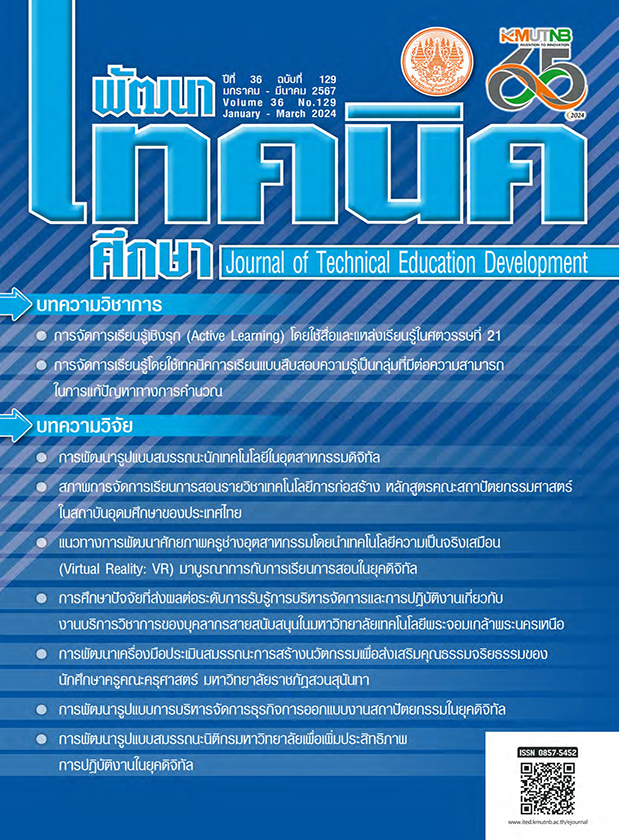Developing a Professional Competency Framework for the University’s Legal Officers to Enhance Their Operational Efficiency in the Digital Age
Main Article Content
Abstract
The research aims and objectives are 1) to investigate the components of professional competencies among the university’s legal officers in the digital age; and 2) to develop an effective competency framework that outlines the necessary skill sets required for these staff members to perform successfully throughout the digital transformation, and 3) to evaluate the effectiveness of the developed competency model to enhance operational efficiency. This study is a qualitative research utilizing the Delphi method to gain expert opinions. The panel consists of 1) 19 legal experts who are holding, or used to hold a position as a legal department Director or equivalent. Their supervisory responsibilities include directing, supervising, and administering legal officers employed in government agencies and private businesses, such as universities, ministries, Office of the Attorney General, state-owned enterprises, and private companies; and 2) a group of 13 legal specialists serving as focus group participants. Research tools consisted of open-ended interview questions and a 5-point Likert scale questionnaire. The median and the interquartile range (IQR) are used for data analysis.
As results, the competency models for specified employees to promote their performance success displays 3 clusters containing 15 core competencies. The first category is Knowledge, encompassing 5 core competencies, i.e. awareness and proficiency on these aspects: 1) the University Act on establishment procedures, regulations, rules and announcements; 2) the laws relating to finance, public procurement alongside labor and employment laws; 3) information technology regulations; 4) civil versus criminal and special laws; and 5) public administration and English language skills. The second category involves Skills, covering 6 skills and expertise in these dimensions: 1) legal interpretation, briefing and analysis of legal issues; 2) mastering skills relevant to legal drafting, criminal procedure and investigations; 3) adoption of information technology and digital tools in legal practice; 4) performance of the contractual obligations and duties on legally-binding documents and agreements; 5) communication, coordination and mediation skills; and 6) mastery of legal data storage, retrieval and provides legal services. The third cluster covers desirable qualities that legal officers should possess, comprising 4 core competencies: 1) a passion for knowledge and legal work, attitudes of organizational commitment, service-minded mindedness and outgoing attitude; 2) exhibiting positive personality traits incorporating being committed, responsible, energetic, diligent, and punctual; 3) adherence to moral and ethical principles, preservation of integrity and reasoning; and 4) self-discipline and conscientiousness for occupational performance.
According to the focus group discussion, the experts agreed on the appropriateness, completeness and transparency of each aspect of the developed competency framework. It is thus recommended for further application to help employees to achieve their full potential.
Article Details

This work is licensed under a Creative Commons Attribution-NonCommercial-NoDerivatives 4.0 International License.
References
มาตรฐานกำหนดตำแหน่งของข้าราชการพลเรือนในสถาบันอุดมศึกษา พ.ศ. 2553 ตำแหน่ง นิติกร
โครงสร้างการบริหารกองกฎหมาย เผยแพร่บนเว็บไซต์กองกฎหมาย มหาวิทยาลัยเทคโนโลยีพระจอมเกล้าพระนครเหนือ https://law.kmutnb.ac.th/?page_id=26
McClelland, D.C. (1973). “Testing for Competence Rather Than for Intelligence.” American Psychologists. Vol 17 : 1-14.
ชัยลิขิต สร้อยเพชรเกษม. (2555). การวิจัยด้วยวิธีเดลฟาย:การใช้มติสอดคล้องโดย เสียงข้างมาก วารสารวิชาการบัณฑิตศึกษามหาวิทยาลัยราชภัฎนครสวรรค์ 7(18) : 1-13.
สำนักงาน ก.พ. (2552). กฏ ก.พ. ว่าด้วยหลักเกณฑ์การจัดประเภทตำแหน่งและระดับตำแหน่งมาตรฐานกำหนดตำแหน่งงาน กพ. ฉบับแกไขเพิ่มเติมครั้งที่ 1 : วันที่ 18 กันยายน พ.ศ. 2552
Kenneth V.L. (2003). Competency Requirements of Purchasing and Supply Management Professional for the Beginning of〖 21〗^st Century by Walden University, New York.
มหาวิทยาลัยเทคโนโลยีพระจอมเกล้าพระนครเหนือ การประชุมสนทนากลุ่ม (Focus Group) งานวิจัย เรื่อง “การพัฒนารูปแบบสมรรถนะนิติกรมหาวิทยาลัย เพื่อเพิ่มประสิทธิภาพในการปฏิบัติงานในยุคดิจิทัล” (16 กุมภาพันธ์ 2567) ณ ห้องราชพฤกษ์ อาคารนวมินทราชินี มจพ.
Sanches (2006). “The Effect of Information Technology Management Capability on Firm Competitiveness.” EMCIS Vol.15 No.18 : 344-355.


